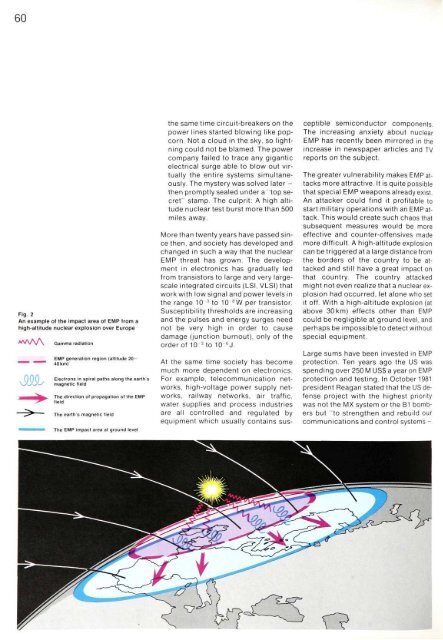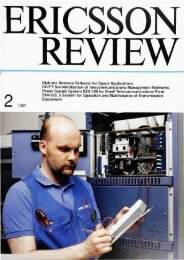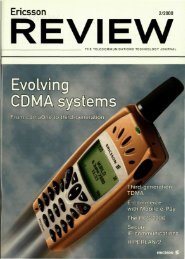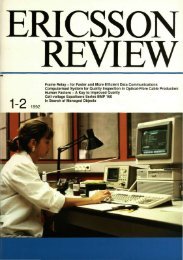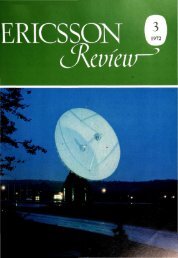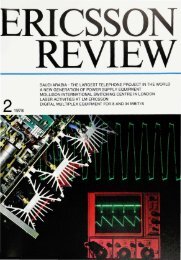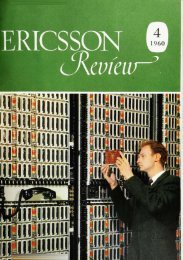TELE-X - a Satellite System for TV and Data Communication ...
TELE-X - a Satellite System for TV and Data Communication ...
TELE-X - a Satellite System for TV and Data Communication ...
Create successful ePaper yourself
Turn your PDF publications into a flip-book with our unique Google optimized e-Paper software.
60<br />
Fig. 2<br />
An example of the impact area of EMP from a<br />
high-altitude nuclear explosion over Europe<br />
EMP generation region (altitude 20-<br />
40 km)<br />
Electrons in spiral paths along the earth's<br />
magnetic field<br />
The direction of propagation of the EMP<br />
field<br />
The earth s magnetic field<br />
The EMP impact area at ground level<br />
the same time circuit-breakers on the<br />
power lines started blowing like popcorn.<br />
Not a cloud in the sky, so lightning<br />
could not be blamed. The power<br />
company failed to trace any gigantic<br />
electrical surge able to blow out virtually<br />
the entire systems simultaneously.<br />
The mystery was solved later -<br />
then promptly sealed under a "top secret"<br />
stamp. The culprit: A high altitude<br />
nuclear test burst more than 500<br />
miles away.<br />
More than twenty years have passed since<br />
then, <strong>and</strong> society has developed <strong>and</strong><br />
changed in such a way that the nuclear<br />
EMP threat has grown. The development<br />
in electronics has gradually led<br />
from transistors to large <strong>and</strong> very largescale<br />
integrated circuits (LSI, VLSI) that<br />
work with low signal <strong>and</strong> power levels in<br />
the range 10~ 3 to 10 8 W per transistor.<br />
Susceptibility thresholds are increasing<br />
<strong>and</strong> the pulses <strong>and</strong> energy surges need<br />
not be very high in order to cause<br />
damage (junction burnout), only of the<br />
order of 10 3 to 10 6 J.<br />
At the same time society has become<br />
much more dependent on electronics.<br />
For example, telecommunication networks,<br />
high-voltage power supply networks,<br />
railway networks, air traffic,<br />
water supplies <strong>and</strong> process industries<br />
are all controlled <strong>and</strong> regulated by<br />
equipment which usually contains susceptible<br />
semiconductor components.<br />
The increasing anxiety about nuclear<br />
EMP has recently been mirrored in the<br />
increase in newspaper articles <strong>and</strong> <strong>TV</strong><br />
reports on the subject.<br />
The greater vulnerability makes EMP attacks<br />
more attractive. It is quite possible<br />
that special EMP weapons already exist.<br />
An attacker could find it profitable to<br />
start military operations with an EMP attack.<br />
This would create such chaos that<br />
subsequent measures would be more<br />
effective <strong>and</strong> counter-offensives made<br />
more difficult. A high-altitude explosion<br />
can be triggered at a large distance from<br />
the borders of the country to be attacked<br />
<strong>and</strong> still have a great impact on<br />
that country. The country attacked<br />
might not even realize that a nuclear explosion<br />
had occurred, let alone who set<br />
it off. With a high-altitude explosion (at<br />
above 30 km) effects other than EMP<br />
could be negligible at ground level, <strong>and</strong><br />
perhaps be impossible to detect without<br />
special equipment.<br />
Large sums have been invested in EMP<br />
protection. Ten years ago the US was<br />
spending over 250 M US$ a year on EMP<br />
protection <strong>and</strong> testing. In October 1981<br />
president Reagan stated that the US defense<br />
project with the highest priority<br />
was not the MX system or the B1 bombers<br />
but "to strengthen <strong>and</strong> rebuild our<br />
communications <strong>and</strong> control systems -


